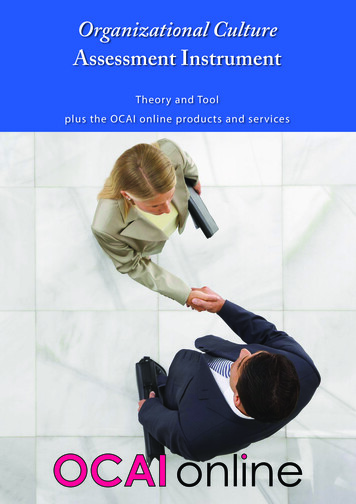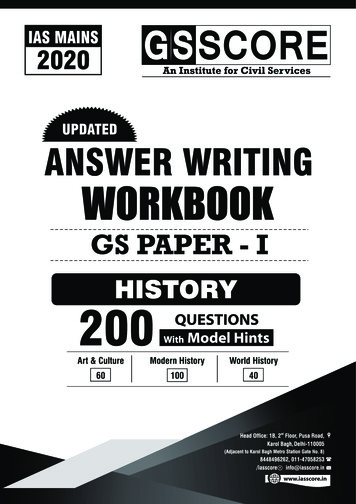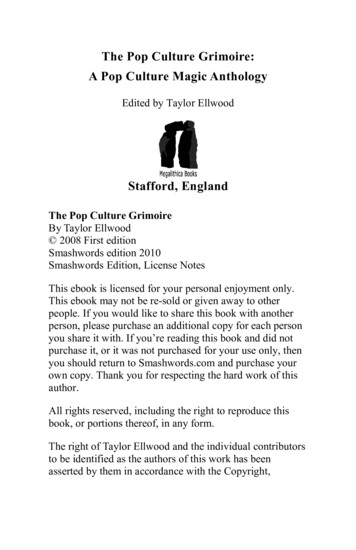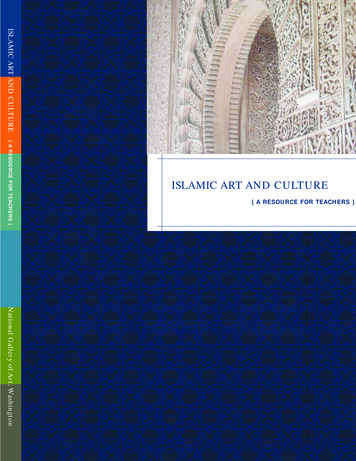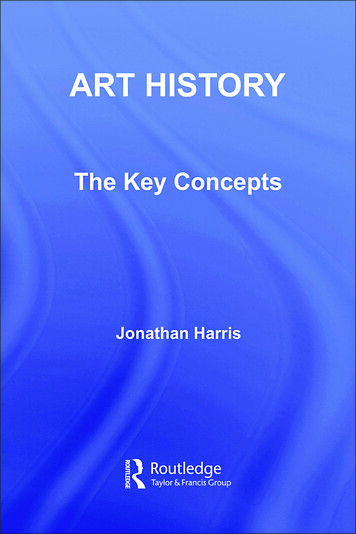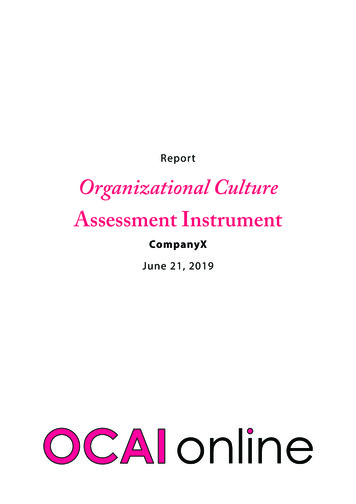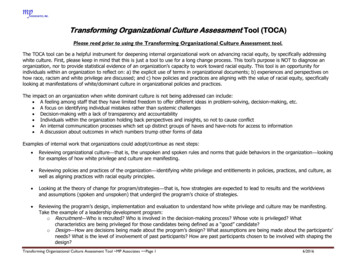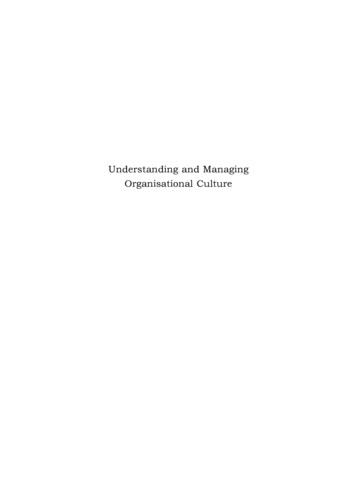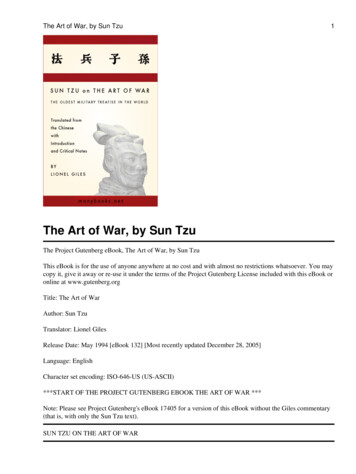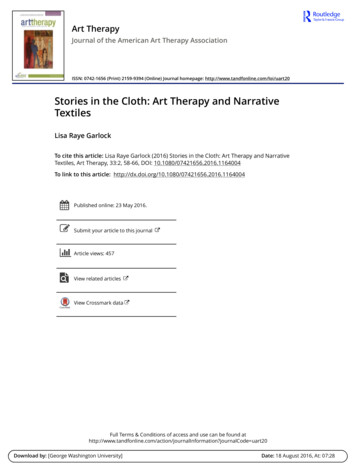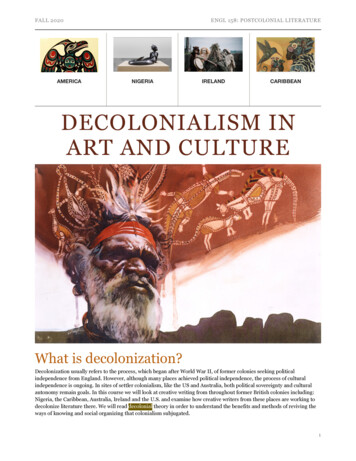
Transcription
FALL 2020AMERICAENGL 158: POSTCOLONIAL LITERATURENIGERIAIRELANDCARIBBEANDECOLONIALISM INART AND CULTUREWhat is decolonization?Decolonization usually refers to the process, which began after World War II, of former colonies seeking politicalindependence from England. However, although many places achieved political independence, the process of culturalindependence is ongoing. In sites of settler colonialism, like the US and Australia, both political sovereignty and culturalautonomy remain goals. In this course we will look at creative writing from throughout former British colonies including:Nigeria, the Caribbean, Australia, Ireland and the U.S. and examine how creative writers from these places are working todecolonize literature there. We will read decolonial theory in order to understand the benefits and methods of reviving theways of knowing and social organizing that colonialism subjugated.1
FALL 2020ENGL 158: POSTCOLONIAL LITERATUREThis special semesterThis course is classified as face-to-face. However, it can be completedcompletely online. There is no penalty for choosing to not attend inperson meetings. They are completely optional. You can also changeyour mind and stop attending in-person meetings for any reason.Class will requirereadings, viewings,discussion andwriting.I understand that you may feel overwhelmed at some point and I inviteyou to reach out to me to discuss how we can ensure your academicsuccess this semester despite the enormous challenges we all face.Email: mbradfor@live.unc.edu (please use your UNC email)Phone: (828) 216-0243Message me through our Sakai page.I go to bed much earlier than I’m sure you all do but, rest assured, I willget back to you asap.If at any time in the semester you fall ill please let the Dean of StudentsOffice know immediately so that an official excuse can be sent to all yourprofessors and you aren’t penalized for being ill: s/request-university-approved-absencesAll information for the course will be available on our Sakai site. All workis to be submitted through Sakai and all your grades and feedback willalso be there.All texts for this class will be available on our sakai site under“Resources”, on reserve in the UL or available for rent online (for films).If you do choose to come to in-personclass times you are required to:1. wear a face covering;2. be free from illness;3. maintain six feet distance betweenyourself and others.We will study severalcultures that have beencolonized by England inorder to understand theongoing legacies of thosehistories. We will alsodiscuss the differencebetween independentformer colonies andcurrent settler colonies.2
DateMon. Aug 10Wed. Aug. 12Fri. Aug. 14Mon. Aug. 17TopicWhat is Decolonialism?Understanding Colonialismas a culturalAssignment DueIntroduction to class, syllabus and SakaiPost on Sakai by 5pm; Read Kauanui, J. Kēhaulani. “‘AStructure, Not an Event’: Settler Colonialism andEnduringIndigeneity.” Lateral, vol. 5, no. 1, Spring 2016,doi:doi.org/10.25158/L5.1.7Colonialism as ongoingstructure not historicaleventNigeriaDiscussion; Read Heart of Darkness by Joseph ConradPost on Sakai by 5pm; Read “Decolonising the Mind”by Ngugi wa Thiong’o PDF on SakaiDiscussion; Watch Half a Yellow Sun, available tostream through the libraryWed. Aug 19Fri. Aug 21Mon. Aug. 24Wed. Aug. 26NO CLASSFri Aug 28Mon. Aug. 31Introduction to NigeriaThe CaribbeanPost on Sakai by 5pm; Read “The Quest for EpistemicLiberation” by Pascah Mungwini PDF on SakaiDiscussion: Nnedi Okorafor short story Spider theArtistIntroduction to the CaribbeanWed. Sep. 2Post on Sakai by 5pm; Watch Life and Debt onreserve at the UL or available for rent on AmazonFri. Sep. 4Mon. Sep. 7Discussion; Watch Rockers on TubiRead “The Cultural Politics of Obeah” by Diana PatonPDF on SakaiPost on Sakai by 5pm; Read “Bush Knowledge” byFunlayo E. Wood PDF on SakaiDiscussion; Read Omeros chapter XLVIII PDF on SakaiOverview of midterm, review of podcast genreWed. Sep. 9Fri. Sep. 11Mon. Sep 14Wed. Sep. 16Fri. Sep. 18Mon. Sep 21Wed. Sep. 23Fri. Sep. 25Mon. Sep. 28Midterm workshopMidterm workshopMidterm dueIrelandIntroduction to IrelandPost on Sakai by 5pm; Read “Decolonization is not aMetaphor” By Eve Tuck PDF on SakaiDiscussion; Watch the Wind that Shakes the Barleyavailable in the UL or to rent onlineRead “A Study in Limits” by Edward O’Boyle PDF onsakai
Post on Sakai by 5pm; Listen to: Jonny Dillon and ClaireWed. Sep. 30Ní Dhubhcháin. Fairy Forts in Folk Tradition. 6,https://soundcloud.com/folklore podcastFri. Oct. 2Mon. Oct. 5Wed. Oct. 7AmericaFri. Oct. 9Mon. Oct. 12Wed. Oct. 14Fri. Oct. 16Mon. Oct. 19Enslavement anddecolonizationWed. Oct. 21Fri. Oct. 23Mon. Oct. 26Wed. Oct. 28AustraliaFri. Oct. 30Mon. Nov. 2Wed. Nov. 4Fri. Nov. 6Mon. Nov. 9Wed. Nov. 11Fri. Nov. 13Final Project in-classworkshopFinal Project in-classworkshopFinal Class; In-classworkshop on Youtube andWordpressDiscussion: Watch the film Song of the Sea, onreserve in the UL or available to rent onlineIntroduction to AmericaPost on Sakai by 5pm; Read “Decolonization is Not aMetaphor” by Eve Tuck and K. Yang PDF on sakaiDiscussion: Watch the film, Smoke Signals onreserve in the UL or available to rent onlineRead “Indigenous Climate Change Studies” by KyleWhyte PDF on sakaiPost on Sakai by 5pm; Read Robin Wall Kimmerer,Braiding Sweetgrass: Indigenous Wisdom, ScientificKnowledge and the Teachings of Plants. MilkweedEditions, 2013 chapter “In the Footsteps ofNanabozho: Becoming Indigenous to Place” PDF onsakaiDiscussion; “The Man to Send Rain Clouds” (1969)PDF on sakaiIntroduction to the legacies of slaveryPost on Sakai by 5pm; Read Prologue: The Path ofStrangers in Lose Your Mother: A Journey Along theAtlantic Slave Route by Saidiya HartmanDiscussion; Watch: Space is the Place available tostream through UNC libraryIntroducing AustraliaPost on Sakai by 5pm; Read “On Being Woken Up” byPatrick Wolfe PDF on sakaiDiscussion; Watch Naji on vimeoRead “The Politics of Writing” by Alexis Wright PDFon SakaiPost on Sakai by 5pm; Read “Colonisation—It’s badfor your health” by Juanita Sherwood PDF on SakaiDiscussion: Watch Charlie’s Country on reserve in theUL and available to rent onlineBring in Midterm and ideas for FinalBring in Rough DraftFinal Project due at the end of class
Mon. Nov. 16Mon. Nov. 23 @12pmFinal Exam Review sessionand collective note sheetcreationFinal ExamLook for google doc link in emailWill be administered through sakai tests and quizzestab, remotelyPoliciesGrading ScaleAB C D F93-100%87-8977-7967-6959 and l assignments major are weighted equally. Forum posts are worth 1/10th of a majorassignment grade.Please remember that the syllabus functions as a contract between instructor and students. You areresponsible for knowing and abiding by these policies:Each writing assignment will involve drafting and revision and may involve research. Because writing is arecursive, unpredictable, and multi-step process, careful advance planning is essential to avoid fallingbehind. Late work—whether it is homework, a draft for a workshop day, or a project—will be penalized.The instructor reserves the right to not accept late work.Communicate regularly and professionally with your instructor.The more discussion you have with your instructor about your work the more you will have anopportunity to improve. Take advantage of office hours to discuss your work. Please email me from yourUNC email.Community Standards in Our Course and Mask Use. This fall semester, while we are in the midst of aglobal pandemic, all enrolled students are required to wear a mask covering your mouth and nose at alltimes in our classroom. This requirement is to protect our educational community -- your classmates andme – as we learn together. If you choose not to wear a mask, or wear it improperly, I will ask you to leaveimmediately, and I will submit a report to the Office of Student Conduct. At that point you will bedisenrolled from this course for the protection of our educational community. Students who have anauthorized accommodation from Accessibility Resources and Service have an exception. For additionalinformation, see ines-for-facemasks/.Students with Disabilities: The University of North Carolina at Chapel Hill (UNC Chapel Hill) ensures thatno qualified person shall by reason of a disability be denied access to, participation in, or the benefits of,any program or activity operated by the University. Each qualified person shall receive reasonable
accommodations to ensure equal access to educational opportunities, programs, and activities in the mostintegrated setting appropriate.The Honor Code: The honor code applies to everything that you—and I—do at this university, includingour use of outside sources in our research and writing. Our work in this class will conform to theprinciples and procedures defined in the Instrument of Student Judicial Governance(http://instrument.unc.edu/). The research that we do this semester, whether primary or secondary, printor online, formal or informal, will require careful documentation on your part. We will review citationguidelines early and often throughout the semester. The need to cite your sources applies to all yourwork, including drafts as well as final versions of your feeders and projects. When in doubt: CITE. If youthink you are running into trouble with a paper, PLEASE come and speak with me. It is much, muchbetter to take a late penalty on an assignment than to risk Honor Court proceedings.Non-Discrimination Policy: Any student who is impacted by discrimination, harassment, interpersonal(relationship) violence, sexual violence, sexual exploitation, or stalking is encouraged to seek resources oncampus or in the community. Please contact the Director of Title IX Compliance (Adrienne Allison –Adrienne.allison@unc.edu), Report and Response Coordinators in the Equal Opportunity and ComplianceOffice (reportandresponse@unc.edu), Counseling and Psychological Services (confidential), or the GenderViolence Services Coordinators (gvsc@unc.edu; confidential) to discuss your specific needs. Additionalresources are available at safe.unc.eduResourcesYour Computer: If you should have any issues with your computer please chat ITS: 919‐962-HELP (4357)or help.unc.eduLive chat: https://its2.unc.edu/itrc/chat/index.htmlIn addition, there is walk‐in support in the basement of the House Undergraduate Library and SASB SouthBuilding. The hours are posted here: http://help.unc.edu/2083The Writing Center: The UNC Writing Center, located in SASB North and in Greenlaw Hall #221, offersfree tutoring services for students. You may visit the Writing Center to ask for help with a specific paper,whether you are concerned with developing ideas and content, organizing your assignment, or workingon style issues. To make an appointment, browse the Writing Center's online resources, or send a draftonline, please go to (http://www.unc.edu/depts/wcweb/). To make best use of your time there, pleasebring a copy of your assignment sheet and your draft with you. The Writing Center will not proofreadpapers or talk with you about grades.Students with Disabilities: The University of North Carolina at Chapel Hill (UNC Chapel Hill) ensures thatno qualified person shall by reason of a disability be denied access to, participation in, or the benefits of,any program or activity operated by the University. Each qualified person shall receive reasonableaccommodations to ensure equal access to educational opportunities, programs, and activities in the mostintegrated setting appropriate.Counseling and Psychological Services: CAPS is strongly committed to addressing the mental health needsof a diverse student body through timely access to consultation and connection to clinically appropriate
services, whether for short or long-term needs. Go to their website: https://caps.unc.edu or visit theirfacilities on the third floor of the Campus Health Services building for a walk-in evaluation to learn more.Accessibility Resources & Service: UNC-Chapel Hill facilitates the implementation of reasonableaccommodations for students with learning disabilities, physical disabilities, mental health struggles,chronic medical conditions, temporary disability, or pregnancy complications, all of which can impairstudent success. See the ARS website for contact and registration information: https://ars.unc.edu/aboutars/contact-us
ENGL 158Sakai PostsFor the most part, each Friday we willdiscuss the readings that were assignedfor the classes on Monday andWednesday of that week (and, in somecases, the readings from the previousweek as well). By Wednesday night at5pm, each week, you should post aparagraph-form question, comment orresponse to the week’s readings on ourclass’s Sakai page in that week’s forum.The purpose of this is to give you achance to formulate your thoughts onthe reading material so that ourdiscussions are as helpful as possible. Ifeveryone comes to class with somethoughts already prepared, ourdiscussions will be more fruitful. See“Discussion Leader Days” below formore on your responsibilities whenleading discussion.Directions: Log onto our Sakai site andclick on the Forums tab on the left. Clickon the link to the forum that has thecorrect dates for the week’s reading.Add your question paragraph in a newthread by clicking on the “Start a NewConversation” button or, respond to oneof your classmate’s responses by clickingon their title and then clicking respondon their post’s page. In the title, typeyour full name so I can more easily trackyour responses, i.e. “Joe Smith’sresponse for 9/5.”Questions/topics should be wellthought-out, detailed, and specific, inorder to provide a direction for classdiscussion. All posts should be incomplete sentence form, and severalsentences long. It is not enough merelyto pose a question; you must alsointroduce it with context. Below is a setof guidelines for types of questions ortopics:POTENTIAL POST TOPICSOther ideas for posts:Draw connections or compare the text withan earlier work we have discussed in theclass. Select particular elements of these twotexts for comparison.Choose a social or historical topic from lecture thatseems particularly important for understanding the textand draw specific connections.Discuss the specific theory of decolonialism that is beingaddressed in relation to another theory ofdecolonialism.Choose a passage or line from the text that you feel isintegral to understanding a particular aspect of thetext’s importance or meaning. Provide the passage(“first word last word” and the page number should besufficient) and also the aspect of the text or topic thatyou want to discuss in relation to it, for instance, nonnative language or religion.You may also use the discussion questionpost to tackle an element of the text that youfind confusing or ambiguous. However, youmust make sure that these questions are justas detailed and specific as any other topicyou would suggest. Don’t ask, “What isdecolonialism?” Ask, “What is decolonialismreally asking for here? What are the benefitsand risks of writing in English?” Essentially,be specific about what you want clarified indiscussion.
ENGL 158Discussion Leader DaysEach of you is required to lead discussionduring one class this semester. Thissemester, because of social distancing,this practice will look different than inthe past however, you will follow thesame, general guidelines. The week youlead class discussion you are not requiredto post questions on Sakai. Instead, youwill read your classmates sakai posts andpick a main ideas/theme you interestedin leading a discussion on. You willcreate a guide for yourself, which will beturned into me at the end of class andwill be used to assess your preparationfor leading discussion. Be prepared withmany potential areas for discussionsince, what you find intriguing about atext, others may not, and it is verydifficult to lead a discussion when othersare disinterested. To start, log ontoSakai and read over the questions andcomments others have posted. If youfind that many folks are interested in anissue relative to our reading, synthesizetheir responses into one of your own andbring it in to pose it to the group. Youshould also include one or two of yourown, original thoughts about things youfind interesting or perplexing.These thoughts should be based on thereadings for your particular classmeeting, but they may also drawconnections to previous readings,lectures, or discussions. Address areasthat you found particularly interesting,that confused you, or that strike you ascentral problems or concepts. At leasttwo of your questions should be linkedto a certain passage from the readings—try to limit this passage to one to twopages in length and be prepared toclosely read and analyze this passagewith the class.When a discussion is going well, it willoften facilitate itself; if the conversationmoves on to a different (but still relevantand productive) topic, don’t feel that youneed to interrupt it. If other folks in theclass have questions or issues theywould like to raise, you are welcome toentertain them. On the other hand,there will inevitably be lulls or disruptivetangents in the conversation; these arethe times to refocus the group andperhaps turn to a new discussionquestion.For this semester, our in-classdiscussions will be necessarily limited inthe number of people due to socialdistancing requirements. Our class willbe broken into groups and you will leaddiscussion with only your small group inperson. However, the rest of the classwill follow along in your discussionthrough zoom and may ask questionsthrough the comment function.In the event that classes are movedentirely online we will conductdiscussions entirely through zoom. Yourtopic will be circulated prior to class andzoom links will be sent out for separategroups, which people can self-select,based on topic.I will grade you during your leading ofdiscussion based on how well youinclude all people in the conversation,focus the conversation on relevant andinteresting aspects of the reading andhow you respond to the comments andquestions of others in the discussion.
Whyte PDF on sakai Wed. Oct. 14 Post on Sakai by 5pm; Read Robin Wall Kimmerer, Braiding Sweetgrass: Indigenous Wisdom, Scientific Knowledge and the Teachings of Plants. Milkweed Editions, 2013 chapter "In the Footsteps of Nanabozho: Becoming Indigenous to Place" PDF on sakai Fri. Oct. 16 Discussion; "The Man to Send Rain louds" (1969)
